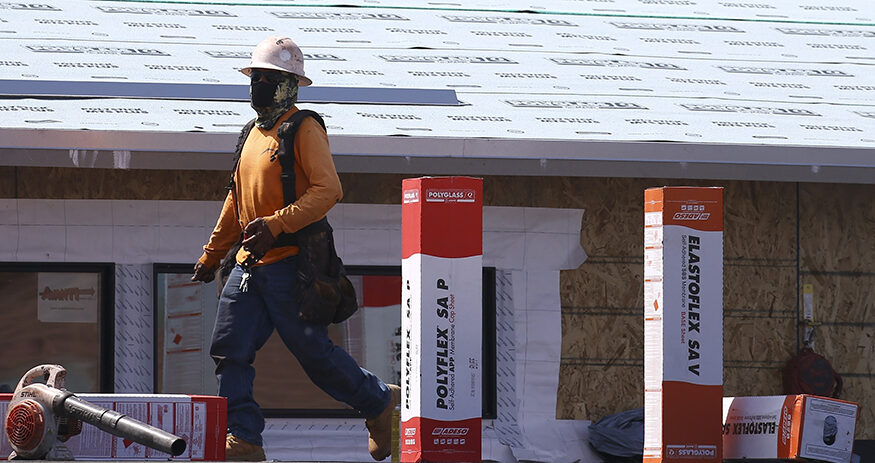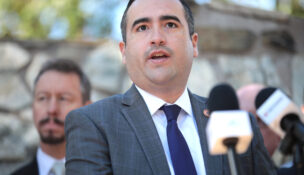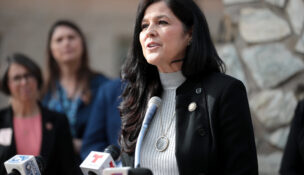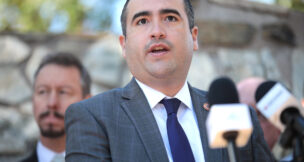Finding bipartisan solutions to affordable housing shortage continues
Jakob Thorington Arizona Capitol Times//January 9, 2025//
Finding bipartisan solutions to affordable housing shortage continues
Jakob Thorington Arizona Capitol Times//January 9, 2025//
Lawmakers at the state Capitol have made some strides to increase affordable housing in recent sessions, but both parties are prioritizing the issue in 2025 as housing prices continue to rise.
Republicans have tied the issue to water supply. During a Joint Legislative Ad Hoc Study Committee on Water Security meeting on Dec. 18, Republicans criticized an Arizona Department of Water Resources recently adopted rule – Alternative Path to Designation of Assured Water Supply – which requires housing developer applicants to satisfy a 25% groundwater offset in addition to the state’s 100-year assured water supply requirement.
“The Department’s 25% groundwater tax will have vast economic and political consequences that will negatively impact the homebuilding industry, price of water, and cost of living,” committee co-chair Rep. Gail Griffin, R-Hereford, said in a news release. “This will dramatically increase the cost of new housing for hard-working Arizonans who have already been hurt over the past several years by out-of-control rising prices.”
The median home price in the state has increased substantially over five years. Real estate brokerage Redin calculated the median price in the state at $281,000 in November 2019. As of November 2024, that jumped nearly 60% to $447,000.
Spencer Kamps, vice president of legislative affairs for the Home Builders Association of Central Arizona, told lawmakers that the state needs to pick up the pace on building new homes.
“There’s no doubt that Arizona is facing a severe housing crisis,” Kamps said. “We simply do not have enough homes to meet current demand. These water implications literally could not have come at a worse time for the Phoenix metro area.”
The Arizona Department of Housing estimated a housing shortage of 270,000 units in 2022 and the Common Sense Institute estimated a 65,000 unit shortage in October 2024, but attributed the number to a fall in demand rather than rising supply.
In a resolution adopted on Dec. 18, Republicans called the new assured water supply rule “illegal, inconsistent with legislative intent, and beyond the Department’s statutory authority.”
Representative-elect Kevin Volk, D-Tucson, has a professional background in real estate and housing construction with his sustainable affordable housing company Vivablox. He attributed housing market challenges to higher interest rates, construction costs, material shortages and labor issues.
“There’s certainly more to be done on streamlining processes for development and streamlining processes in a way that accommodates some innovative ways to approach housing,” Volk said. “We can’t just have systems that are solely designed for the same exact type of new subdivision development.”
No housing bills have been prefiled by any lawmakers as of Jan. 9, but the 2025 session could see the return of some housing bills from the previous year.
Gov. Katie Hobbs clashed against a bipartisan coalition of lawmakers last session after she vetoed the Arizona Starter Homes Act, which proposed to limit the ability for cities of 70,000 or more to have design regulations ranging from lot sizes, design features, and local governments requiring homeowners associations.
Hobbs cited public safety concerns with the bill in her veto letter after the U.S. Department of Defense and local firefighters asked her to oppose the bill due to roads not being equipped to handle the increased density the bill would have allowed.
But with bill sponsors Rep. Leo Biasicucci, R-Lake Havasu City, and Senator-elect Analise Ortiz, D-Phoenix, returning to the Legislature, the bill could come back.
The Arizona Department of Housing is also up for a sunset review this year and housing policy groups, including the Arizona Housing Coalition, are urging lawmakers to renew the agency.
The coalition is also seeking a renewal of the state’s Affordable Housing Tax Credit program, which started in 2021 and will expire at the end of 2025. Other policy goals the coalition outlined for the upcoming session include allowing faith-based organizations to develop affordable housing on their properties and for further spending on homelessness resources.
Former state Rep. Marcelino Quiñonez sponsored HB2815 in 2024, but the bill did not get through the Senate. The measure would have prevented municipalities from undergoing local governmental review for faith-based organizations seeking to build housing on their properties, although the measure would also require any organizations that build housing to notify county assessors that their properties no longer qualify for tax exemptions.
Most Republicans opposed HB2815 in 2024 because of the potential of churches losing tax-exempt status and opposition also came from some Republicans who wanted to preserve sacred spaces.
Legislative Democrats have pitched other housing solutions, including capping corporate landlords’ ability to buy properties in the state and prohibiting source-of-income discrimination, but those bills didn’t receive committee hearings in previous sessions.














































